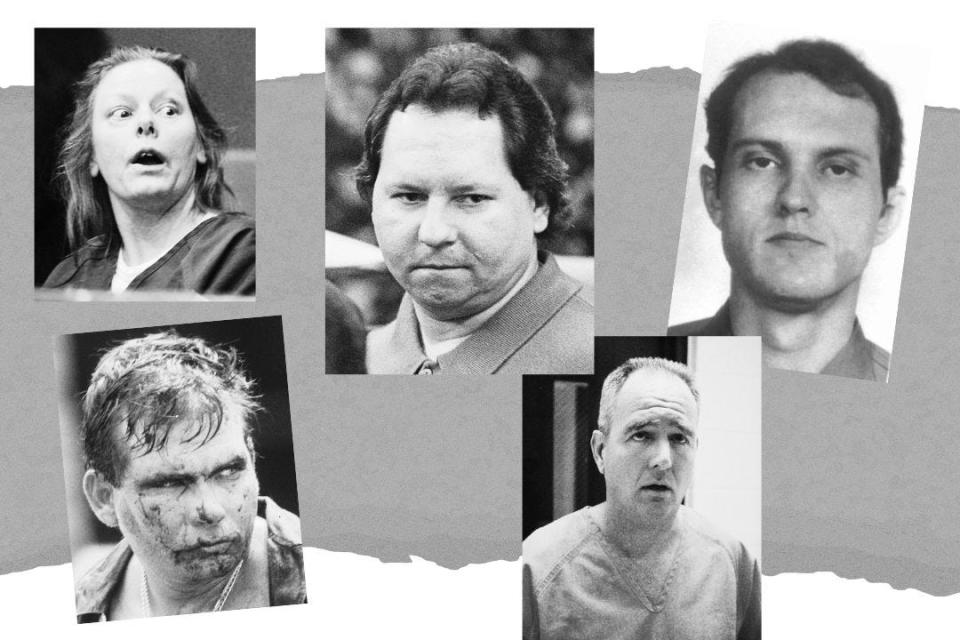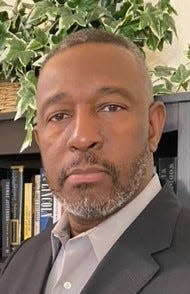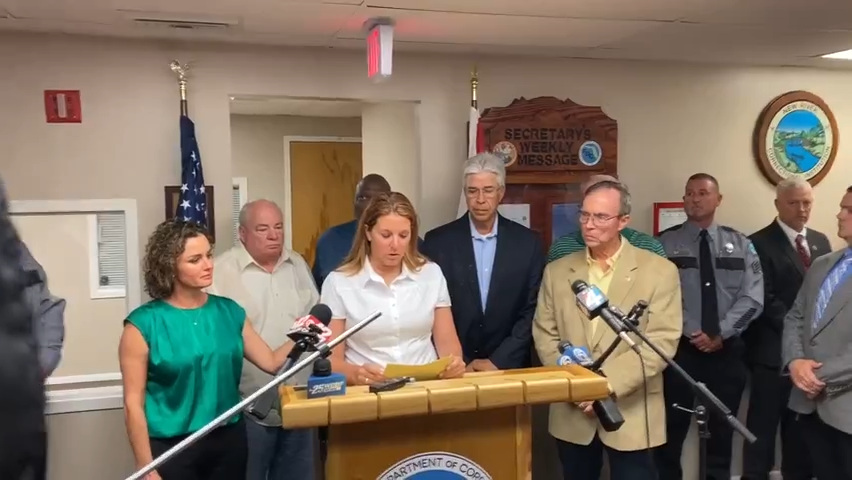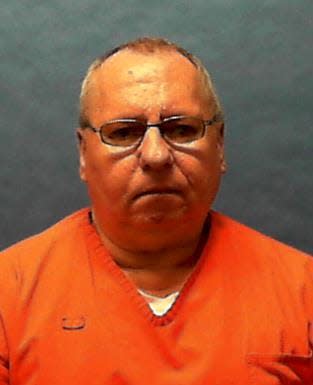What it's like for a reporter to witness a death row execution: 'I'll never do it again'
Palm Beach Post Staff Reporter Wayne Washington covered the execution of convicted murderer Duane Owen on June 15, 2023. Here is his recollection of that day.
Aug. 3 brought another execution to Florida.
I was there on June 15 when convicted murderer Duane Owen was put to death. I was not there earlier this month when another convicted murderer, James Barnes, was executed at Florida State Prison in Raiford, about 40 miles northeast of Gainesville.
Indeed, it is my intention never again to witness what I saw on that rainy mid-June day — the moment when a man becomes a body.
In the normal course of things, I wouldn't be called on to cover an execution. I cover a pair of cities for The Palm Beach Post — West Palm Beach and Riviera Beach — and I write other stories on social justice.
Owen's trial and execution weren't related to anything in my coverage area. But Owen had committed his terrible crimes in Palm Beach County, and the paper wanted to follow his case to the end.
It wanted me to follow it to the end.

An editor at The Post, Holly Baltz, called me to ask if I'd be willing to cover Owen's execution. She made it clear that I could decline the assignment, and she made it clear that, if I took it and needed help afterward, the paper would make sure I got it.
So, I decided to do it.
Raiford State Prison: Lots of barbed wire and an eerie silence
The day after I got to Raiford — the day before Owen was to be executed — I drove to the state prison to get a sense of the place. It is a sprawling facility marked by more barbed wire than I have ever seen in my life. And it was quiet. Only the occasional car driving on the state road outside of the prison made any sound at all.
I drove back to the hotel and tried again to reach relatives of Owen's victims. I reached a sister of one of the people he killed. She was living in California and politely declined to discuss the case.
Witness to executions: What it was like watching serial killer Aileen Wuornos, UF killer Danny Rolling being put to death
What I wrote would hinge on what I saw the day Owen was executed.
By the time Thursday morning rolled around, Owen's final appeals had been exhausted. He would be executed unless there was a last-minute stay granted on grounds not covered by any of his other appeals.
There was zero chance Gov. Ron DeSantis, who had already signed Owen's death warrant, would suddenly change his mind.
Witness to an execution: After watching the execution of William Van Poyck, 'the world didn't seem safer. I was just numb'
At a desk in my hotel room, I wrote out the shells of two stories — one that would be used if Owen was executed and another we could use if he somehow got a stay.
Then, I drove to the state prison. I and the other seven journalists allowed to "witness" the execution had been told to get there several hours early for a press conference.
A thunderstorm erupted just as reporters began arriving at a tent for the press conference.
Witness to an execution: I saw cop-killer Jesse Tafero die in the electric chair. Flames shot up from his head

Reporters — another print reporter, a radio journalist who said he had covered many executions and TV journalists from different parts of the state — were told of Owen's last meal. I asked if he had had any visitors.
"No," a spokeswoman for the state Department of Corrections told me.
It was almost like a press conference where we were learning about a government grant or assistance program. Except, across the road, somewhere within that mountain of barbed wire, Owen waited to be executed.
In a few hours, we would all get in a van and be driven to the death house.
Rules for reporters: No pens, notebooks, recording devices or cell phones allowed
The full weight of what I was about to witness began to settle on me. I decided to wait in my car, listening to a book as rain fell outside.
When the vans pulled up, I got out of my car and went under the tent where the press conference had been held. I had forgotten the very detailed and very firmly issued FDOC instructions: no notebook, no computer or recording device, no cell phone. No wallet or purse. Journalists were not allowed to bring their own pens or pencils.
I turned off my phone and took it, my notepad and pen back to my car, making sure to lock it. It occurred to me that, when I had access to my phone again, Owen would likely be dead.
Reporters were given a manila envelope with a small notebook, two pencils and some detail about the process of execution in Florida.
The macabre made mundane, I thought, as I climbed into the van.
There was nervous banter among the journalists. The radio guy who had seen so many executions gave us a rundown of what we could expect.
FLORIDA'S DEATH ROW: 305 people live there. Only 8 killed victims in Palm Beach County.
After the brief drive across the road, we parked in front of a gate surrounded by fencing and barbed wire. As first one gate and then another opened and closed with a loud clang, I remembered that scene from "The Shawshank Redemption" when the main character sees the sky above blotted out as he is escorted into prison.
I thought to myself: No Black man in his right mind voluntarily enters a state prison. I clutched my lone source of identification, my work ID from The Palm Beach Post.
That's what I showed the guard as we approached the security area. She noted it, checked my name off a list and pointed to the machines that would scan us for contraband.
We had been told we could bring dollar bills for the vending machines, but, with only 20 to 25 minutes to go before the execution, I had no appetite. I used the bathroom and took a seat with other journalists in what appeared to be a visiting area. The table and chairs were metal and bolted down to the floor.
A clock on the wall was a reminder of the preciousness of time
I took out the pencil and notebook and wrote down some notes. I wasn't sure if what I had seen or heard up to this point would make it into the story, but I just wanted to keep my mind occupied on work and not on the clock on the wall.
But I couldn't help noticing that clock. It was round, black and white, the type normally found in a hospital ward or in a classroom.
THE DUANE OWEN MURDERS: He killed babysitter Karen Slattery, 14, and woman, 38, as children slept
A 5:45 p.m., 15 minutes before the execution, we were ushered through the building and taken to vans that drove us to another small building. We were told that, once inside, there would be no talking.
As we took our seats, I noticed that friends and family members of the victims were already there. I read that Palm Beach County Public Defender Carrie Haughawout was there, but I did not notice her.

I counted the number of people in the room, including the tall, stern men who stood expressionless by the door. As we sat, a large window faced us.
All there was to do was to stare ahead. Because a screen had been pulled down, all we could see when we stared was ourselves. For some reason, that felt damning.
At 6 p.m., a first glimpse of the man who only had minutes remaining in his life
At exactly 6 p.m., the screen lifted. Owen was already on a gurney, one arm exposed. No one watching said anything.

The room was stark white. Another movie scene came to mind, a scene from "The Exorcist" when an image of the priest's mother, bathed in a stark white light, calls out to him as he deals with the possessed girl. It's a terrifying trick of the priest's mind, meant to distract him and foster doubt.
Those images, the movie scene and the first glimpse of Owen in that white light, stayed with me for weeks after his execution. They would sometimes pop into my head, unbidden, when I closed my eyes. It was random, and I worried the images wouldn't fade.
I didn't tell my friends or family that I was seeing those images in my head for weeks after the execution.
Owen's execution was as unremarkable for FDOC as it was remarkable for me. At one point, a guard shook him and checked an eye for movement. His body jerked rapidly, and his chest heaved. His body, apparently, was fighting the cocktail of drugs used to bring about its demise.
Then, it was over. The guard announced that the sentence had been carried out at 6:14 p.m., and friends and family members were escorted out, followed by journalists.
We were driven in the van back over to the press conference tent. Along the way, I had time to ask the radio reporter if the guard's actions were typical. He said they were, a detail I later confirmed with the FDOC spokeswoman.
Because of the stormy weather, the post-execution press conference was held in a nearby building. Before walking over to it in the rain, I called my editor and gave her a few details so we could get the story online as quickly as possible. I was to write a more detailed piece the next day.
It's been a month and a half since Owen was executed. Images of that white room, with either Owen or the movie priest's mother in it, haven't come to me in weeks.
I do not believe I am haunted by what I saw. I did what I was asked to do, knowing even as I did, that I would never do it again.
Wayne Washington is a journalist covering West Palm Beach, Riviera Beach and race relations at The Palm Beach Post. You can reach him at wwashington@pbpost.com. Help support our work; subscribe today.
This article originally appeared on Palm Beach Post: Reporter who witnessed Duane Owen execution: 'I'll never do it again'

